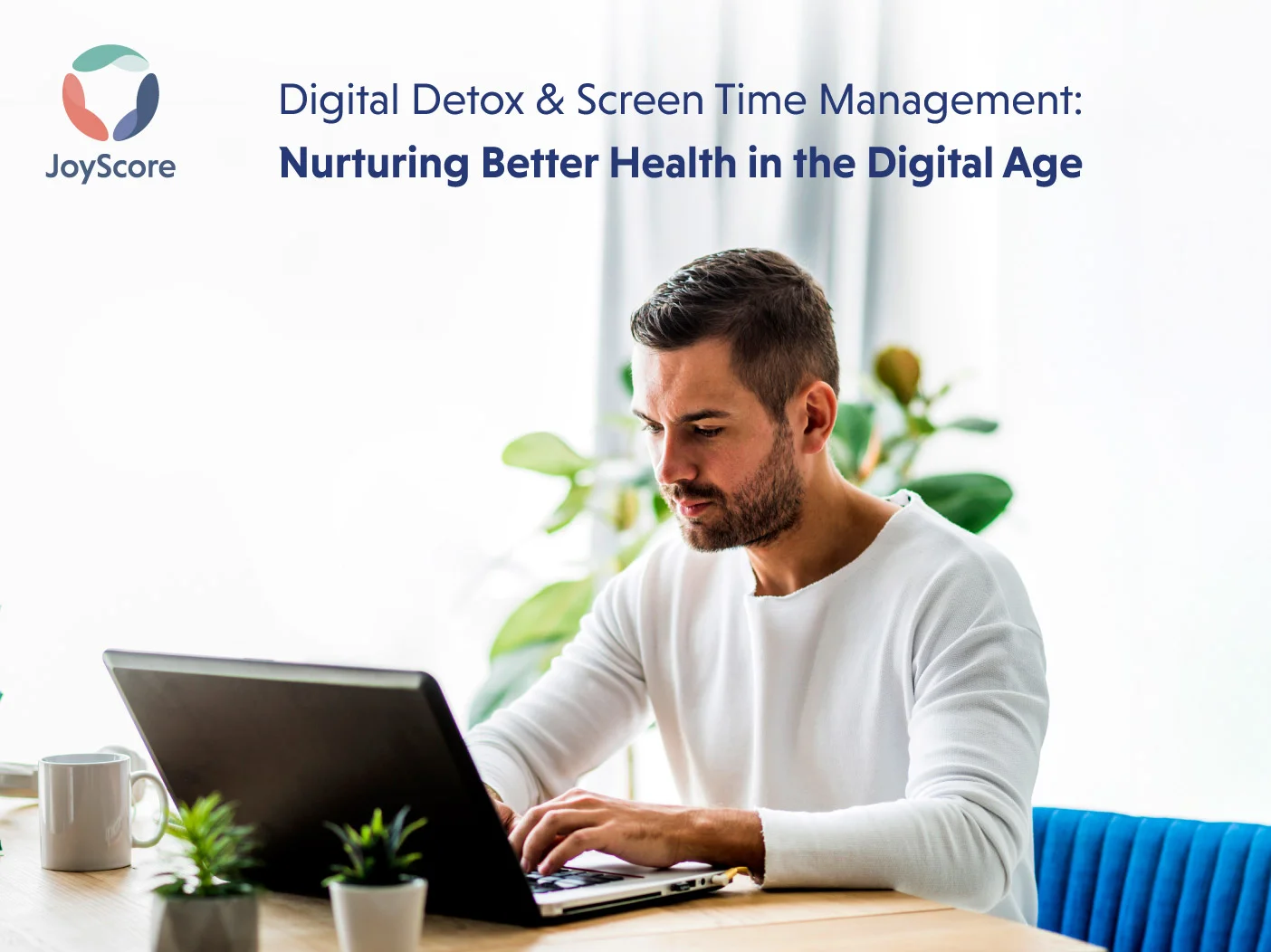In an age defined by screens, digital devices, and relentless connectivity, taking a step back from technology has become vital to preserving our well-being. The practice of digital detox, along with effective screen time management, can unlock a multitude of benefits, helping us regain control over our lives and nurturing better health. This comprehensive article will explore the various facets of digital detox and screen time management, understanding their significance, ways to reduce screen time habits, strategies for controlling screen addiction, and ultimately, how limiting screen time can lead to better health. Download Joyscore to learn more about the benefits of digital detox.
The Digital Invasion
The advent of the Digital Age brought about unprecedented convenience, efficiency, and access to information. The digital revolution has ushered in unprecedented connectivity, information access, and productivity. However, it has also led to a surge in screen time. According to a 2021 study by the Pew Research Center, 85% of adults in the United States own a smartphone, and most Americans spend nearly 4 hours a day on their mobile device alone. This increase in screen time has given rise to various health issues.
The Impact on Physical Health
Extended screen time can have adverse effects on physical health. Prolonged device use is associated with sedentary behavior and a rise in obesity and other health problems. Excessive screen time can make it harder to fall asleep and stay asleep.
Moreover, the constant use of digital devices can lead to poor posture, resulting in conditions like “tech neck” and eyestrain. These physical health issues can be exacerbated when screen time is not managed effectively.
The Toll on Mental Health
The digital age has introduced new challenges to our mental well-being. Social media platforms, while connecting us with others, have also been linked to feelings of anxiety, depression, and loneliness. The constant exposure to curated online lives can lead to unrealistic social comparisons, negatively impacting our self-esteem.
The relentless barrage of information and notifications can also contribute to information overload and heightened stress levels. Recognizing that our mental health is intricately linked to our screen time habits is crucial.

Digital Detox Benefits:
Digital detox benefits involve temporarily disconnecting from our digital devices to rejuvenate our mental, emotional, and physical health. The advantages of embracing this practice are numerous:
1. Improved Mental Health: Perhaps one of the most compelling reasons to engage in digital detox is its positive impact on mental health. Continuous screens and digital information exposure can lead to heightened stress, anxiety, and depression. A digital detox provides a much-needed break for your mind, allowing it to reset and recover.
2. Enhanced Productivity: The constant stream of notifications and distractions from screens can hinder productivity. By managing your screen time, you can regain focus, boost creativity, and become more efficient in your daily tasks.
3. Better Sleep: The blue light emanating from screens disturbs the regular secretion of melatonin, a hormone responsible for regulating sleep. Engaging in a digital detox regimen that minimizes screen exposure before bedtime can enhance sleep quality and overall well-being.
4. Increased Physical Activity: Excessive screen time often leads to a sedentary lifestyle. Breaking away from screens creates space for physical activities, ultimately promoting a healthier, more active lifestyle.
5. Preserving Human Connection: Excessive screen time can erode face-to-face interactions, affecting our ability to form deep connections. Digital detox allows you to reconnect with friends and family on a more profound level, fostering stronger relationships.
6. Mindfulness and Presence: The constant need to check our devices can pull us away from the present moment. Engaging in digital detox encourages mindfulness and enables us to engage with our daily experiences fully.
7. Reducing Eye Strain: Staring at screens for extended periods can result in eye strain and discomfort. A digital detox helps alleviate these physical symptoms and promotes eye health.
Reducing Screen Time Habits: How to do it!
While digital detoxes provide a much-needed respite from screens, effective screen time management is equally essential for long-term well-being. To embark on a successful digital detox journey, consider implementing these practical strategies to reduce screen time habits:
1. Set Clear Boundaries: Establish specific times when screens are off-limits, such as during meals or an hour before bedtime.
2. Use Screen Time Tracking Apps: Numerous apps are available to monitor and limit screen time on your devices. These tools can help you become more aware of your digital habits and provide insights for improvement.
3. Create Screen-Free Zones: Designate certain areas in your home, like the dining room or bedroom, as screen-free zones to encourage healthier offline interactions.
4. Seek Support: Share your digital detox goals with friends or family who can provide encouragement and hold you accountable. Consider seeking professional help if necessary or joining support groups.
5. Gradual Reduction: Rather than going cold turkey, gradually reduce your screen time to make the transition more manageable. Start by identifying the most excessive screen-related activities and working on those first.
6. Plan Tech-Free Activities: Make a list of enjoyable activities that don’t involve screens, such as reading a book, taking a walk, or engaging in a hobby.
7. Establish Tech-Free Zones: Designate areas where screens are not allowed in your home. The dining table, for example, can be a screen-free zone during meals.
8. Practice the 20-20-20 Rule: To reduce eye strain, follow the 20-20-20 rule. Every 20 minutes, take a 20-second break and focus your eyes on some object that is at least 20 feet away.
9. Bedtime Routine: Avoid screens at least an hour before bedtime.
10. Silent Notifications: Configure your devices to receive fewer notifications, especially during your designated screen-free times. This reduces the temptation to check your screens constantly.
11. Prioritize Face-to-Face Communication: Opt for in-person conversations or phone calls instead of text messages or emails whenever possible.
Conclusion
The digital age has brought both blessings and challenges to our lives. Read the digital detox benefits and nurture better health in this digital era to balance between our online and offline worlds. Through periodic digital detoxes or thoughtful screen time management, we can reclaim control over our well-being and make technology work for us, not against us. Remember, the key is moderation and mindfulness in our digital interactions, ensuring that we harness the benefits of technology while preserving our physical and mental health.



